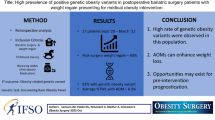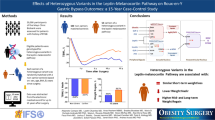Abstract
Background
Mutations in the leptin-melanocortin pathway genes are known to cause monogenic obesity. The prevalence of these gene mutations and their effect on weight loss response after bariatric surgery are still largely unknown.
Objective
To determine the prevalence of genetic obesity in a large bariatric cohort and evaluate their response to bariatric surgery.
Methods
Mutation analysis of 52 obesity-associated genes. Patient inclusion criteria were a BMI > 50 kg/m2, an indication for revisional surgery or an early onset of obesity (< 10 years of age).
Results
A total of 1014 patients were included, of whom 30 (3%) were diagnosed with genetic obesity, caused by pathogenic heterozygous mutations in either MC4R, POMC, PCSK1, SIM1, or PTEN. The percentage total body weight loss (%TBWL) after Roux-en-Y gastric bypass (RYGB) surgery was not significantly different for patients with a mutation in MC4R, POMC, and PCSK1 compared with patients lacking a molecular diagnosis. Of the confirmed genetic obesity cases, only patients with MC4R mutations receiving a sleeve gastrectomy (SG) showed significantly lower %TBWL compared with patients lacking a molecular diagnosis, during 2 years of follow-up.
Conclusions
In this cohort of morbid obese bariatric patients, an estimated prevalence of monogenic obesity of 3% is reported. Among these patients, the clinical effects of heterozygous mutations in POMC and PCSK1 do not interfere with the effectiveness of most commonly performed bariatric procedures within the first 2 years of follow-up. Patients with MC4R mutations achieved superior weight loss after primary RYGB compared with SG.

Similar content being viewed by others
References
Klaauw van der AA, Farooqi IS. The hunger genes: pathways to obesity. Cell. 2015;161:119–32.
Mountjoy KG, Mortrud MT, Low MJ, et al. Localisation of the melanocortin-4 receptor (MC4-R) in neuroendocrine and autonomic control circuits in the brain. Mol Endocrinol. 1994;8:1298–308.
Farooqi IS, O’Rahilly S. 20 years of leptin: human disorders of leptin action. J Endocrinol. 2014;223(1):63–70.
Farooqi IS, O’Rahilly S. Mutations in ligands and receptor of the leptin-melanocortin pathway that lead to obesity. Endocrinol Metab. 2008;4(10):569–77.
Nordang GBN, Busk OL, Tveten K, et al. Next-generation sequencing of the monogenic obesity genes LEP, LEPR, MC4R, PCSK1 and POMC in a Norwegian cohort of patients with morbid obesity and normal weight controls. Mol Genet Metab. 2017;121:51–6. https://doi.org/10.1016/j.ymgme.2017.03.007.
Roux CW le , Heneghan HM. Bariatric surgery for obesity. Med Clin N Am 2018;108;165–182.
Dogan K, Betzel B, Homan J, et al. Long-term effect of laparoscopic Roux-en-Y gastric bypass on diabetes mellitus, hypertension and dyslipidaemia in morbidly obese patients. Obes Surg. 2014;24:1835–42.
Homan J, Boerboom A, Aarts E, et al. A longer biliopancreatic limb in Roux-enY gastric bypass improves weight loss in the first years after surgery: results of a randomized controlled trial. Obes Surg. 2018;28:3744–55. https://doi.org/10.1007/s11695-018-342.
Felsenreich DM, Langer FB, Kefurt R. Weight loss, weight regain and conversions to Roux-en-Y gastric bypass: 10 year results of laparoscopic sleeve gastrectomy. Surg Obes Relat Dis. 2016;12(9):1655–62.
Nedelcu M, Khwaja HA, Rogula TG. Weight regain after bariatric surgery – how should it be defined? Surg Obes Relat Dis. 2016;12(5):1129–30. https://doi.org/10.1016/j.soard.2016.04.028.
Censani M, Conroy R, Deng L, et al. Weight loss after bariatric surgery in morbidly obese adolescents with MC4R mutations. Obesity. 2014;22(1):225–31.
Aslan YR, Campos GM, Calton MA, et al. Weight loss after Roux-en-Y gastric bypass in obese patients heterozygous for MC4R mutations. Obes Surg. 2011;21:930–4.
Valette M, Poitou C, Le Beyec J, et al. Melanocortin-4 receptor mutations and polymorphisms do not affect weight loss after bariatric surgery. PLoS One. 2012;7(11):e48221.
Moore BS, Mirshahi UL, Yost EA, et al. Long-term weight-loss in gastric bypass patients carrying melanocortin 4 receptor variants. PLoS One. 2014;9(4):e93629. https://doi.org/10.1371/journal.pone.0093629.
Li Y, Zhang H, Tu Y, et al. Monogenic obesity mutations lead to less weight loss after bariatric surgery: a 6-year follow-up study. Obes Surg. 2019;29(4):1169–73. https://doi.org/10.1007/s11695-018-03623-4.
Kleinendorst L, Massink MPG, Cooiman MI, et al. Genetic obesity: next-generation sequencing results of 1230 patients with obesity. J Med Genet. 2018;(0):1–9. https://doi.org/10.1136/jmedgenet-2018-105351.
Richards S, Aziz N, Bale S, et al. Standards and guidelines for the interpretation of sequence variants: a joint consensus recommendation of the American College of Medical Genetics and Genomics and the Association of Molecular Pathology. Genet Med. 2015;17(5):405–24. https://doi.org/10.1038/gim.2015.30.
Dijkhorst PJ, Boerboom AB, Janssen IMC, et al. Failed sleeve gastrectomy: single anastomosis duodenoileal bypass or Roux-en-Y gastric bypass? A multicentre cohort study. Obes Surg. 2018;28:3834–42. https://doi.org/10.1007/s116965-018-3429-z.
Cooiman MI, Kleinendorst L, Zwaag van der B, et al. Genetic analysis in the bariatric clinic; impact of a PTEN gene mutation. Mol Genet Genomic Med. 2019:e00632. https://doi.org/10.1002/mgg3.632.
Farooqi IS, Keogh JM, Yeo GS, et al. Clinical spectrum of obesity and mutations in the melanocortin-4-receptor gene. N Engl J Med. 2003;348:1085–95.
Stutzmann F, Tan K, Vatin V, et al. Prevalence of melanocortin-4 receptor deficiency in Europeans and their age-dependent penetrance in multigenerational pedigrees. Diabetes. 2008;57:2511–8.
Hatoum IJ, Stylopoulos N, Vanhoose AM, et al. Melanocortin-4 receptor signaling is required for weight loss after gastric bypass surgery. J Clin Endocrinol Metab. 2012;97:1023–31.
Lubrano-Berthelier C, Dubern B, Lacorte JM, et al. Melancortin 4 receptor mutations in a large cohort of severely obese adults: prevalence, functional classification, genotype-phenotype relationship and lack of association with binge eating. J Clin Endocrinol Metab. 2006;91(5):1811–8.
Miraglia del Guidice E, Cirillo G, Nigro V, et al. Low frequency of melanocortin-4 receptor (MC4R) mutations in a Mediterranean population with early-onset obesity. Int J Obes. 2002;26:647–51.
Challis BG, Pritchard LE, Creemers JWM, et al. A missense mutation disrupting a dibasic prohormone processing site in pro-opiomelanocortin(POMC) increases susceptibility to early-onset obesity through a novel molecular mechanism. Hum Mol Genet. 2002;11(17):1997–2004.
Philippe J, Stijnen P, Meyre D, et al. A nonsense loss-of-function mutation in PCSK1 contributes to dominantly inherited human obesity. Int J Obes. 2015;39:295–302.
Creemers JWM, Choquet H, Stijnen P, et al. Heterozygous mutations causing partial prohormone convertase 1 deficiency contribute to human obesity. Diabetes. 2012;61:383–90.
Bonnefond A, Raimondo A, Stutzmann F, et al. Loss-of-function mutations in SIM1 contribute to obesity and Prader-Willi-like features. J Clin Invest. 2013;123:3037–41. https://doi.org/10.1172/JCI68035.
Elkhenini HF, New JP, Syed AA. Five-year outcome of bariatric surgery in a patient with melanocortin-4 receptor mutation. Clin Obes. 2014;4:121–4.
Sharples AJ, Charalampakis V, Daskalakis M, et al. Systematic review and meta-analysis of outcomes after revisional bariatric surgery following a failed adjustable gastric band. Obes Surg. 2017;27:2522–36. https://doi.org/10.1007/s11695-017-2677-7.
Locke AE, Kahali B, Berndt SI, et al. Genetic studies of body mass index yield new insights for obesity biology. Nature. 2015;518(7538):197–206.
Dudbridge F. Power and predictive accuracy of polygenic risk scores. PLoS Genet. 2013;9(3):1–17. https://doi.org/10.1371/journal.pgen.1003348.
Brandkvist M, Bjorngaard JH, Odegard RA, et al. Quantifying the impact of genes on body mass index during the obesity epidemic: longitudinal findings from the HUNT study. BMJ. 2019;366:l4067. https://doi.org/10.1136/bmj.l4067.
Acknowledgments
We would like to thank all participating patients for their contribution.
Author information
Authors and Affiliations
Corresponding author
Ethics declarations
This study was approved by the national ethical committee and written informed consent was obtained from all participants included in this study.
Conflict of Interest
The authors declare that they have no conflict of interest.
Additional information
Publisher’s Note
Springer Nature remains neutral with regard to jurisdictional claims in published maps and institutional affiliations.
Electronic Supplementary Material
ESM 1
(DOCX 50 kb)
Rights and permissions
About this article
Cite this article
Cooiman, M., Kleinendorst, L., Aarts, E. et al. Genetic Obesity and Bariatric Surgery Outcome in 1014 Patients with Morbid Obesity. OBES SURG 30, 470–477 (2020). https://doi.org/10.1007/s11695-019-04184-w
Published:
Issue Date:
DOI: https://doi.org/10.1007/s11695-019-04184-w




